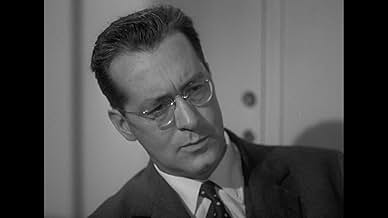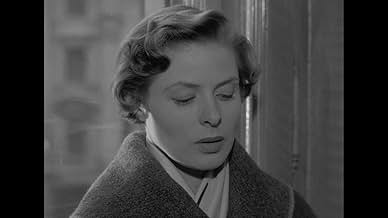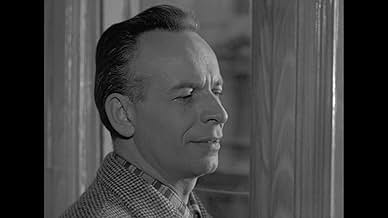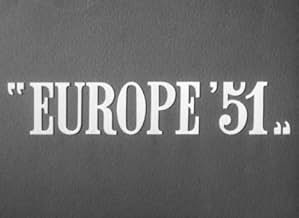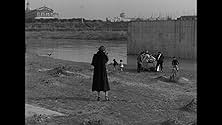IMDb RATING
7.4/10
5.1K
YOUR RATING
A wealthy woman becomes obsessed with humanitarianism when her young son dies after committing suicide.A wealthy woman becomes obsessed with humanitarianism when her young son dies after committing suicide.A wealthy woman becomes obsessed with humanitarianism when her young son dies after committing suicide.
- Awards
- 4 wins & 1 nomination total
Carlo Hintermann
- Extra
- (uncredited)
Antonio Pietrangeli
- Psichiatra
- (uncredited)
Rossana Rory
- Infermiera della casa di cura
- (uncredited)
Featured reviews
At first I wasn't sure what the point was of Europa '51. It's a movie that sneaks up on you because the early scenes are not at all about the same thing as everything that comes after. I kept thinking this was going to be a family drama, or some kind of political drama, but I was wrong. I quite like the development of this plot, because it shows how traumatic events can help shape our lives, and change who we are. At the start of this film I didn't care all that much for Ingrid Bergman's character, and I was a bit frustrated at the prospect of following her for the full runtime of this movie. Little did I realize, there were big changes on the way, and that transition impacted me even more because I saw the emotional journey of this character from where she began to where it all ended. I loved the arc of her story, and I was surprised how relevant it seems to the life we all lead every single day.
I think the most impactful thing to me in Europa '51 is that the story made me introspective. I always applaud any film that can get me to the point where I'm contemplating the way I live my own life. The movie shows how our world can be a dark and cynical place, but it also shows the power of love within all that darkness. I was emotional in the climax, not only because I was touched by the way the protagonist had come to view her place in the world, but also because of the way others reacted to her views. It's interesting to see a film tackle this major question of morality without taking it down a religious path. Instead it shows how even those in organized religion can be resistant to the very love and kindness that they preach. Needless to say, I was energized by Europa '51, and found it to be a powerful film that I'd love to explore more and will probably quote to others in the future.
I think the most impactful thing to me in Europa '51 is that the story made me introspective. I always applaud any film that can get me to the point where I'm contemplating the way I live my own life. The movie shows how our world can be a dark and cynical place, but it also shows the power of love within all that darkness. I was emotional in the climax, not only because I was touched by the way the protagonist had come to view her place in the world, but also because of the way others reacted to her views. It's interesting to see a film tackle this major question of morality without taking it down a religious path. Instead it shows how even those in organized religion can be resistant to the very love and kindness that they preach. Needless to say, I was energized by Europa '51, and found it to be a powerful film that I'd love to explore more and will probably quote to others in the future.
It's a bit melodramatic, but up until Irene's final conversation with Cassatti the Commie, *Europa '51* is a very interesting film, first about a pampered rich woman's reaction to her son's death, then about the difference between windy Marxist propaganda and real compassion.
However, at that point, Rossellini's original idea takes over: He wanted to make a film about what would happen if a truly saintly person ever showed up in the modern world. And he had a very good idea of what would happen--or at least a very insistent one. The people here obviously behave the way they do solely to make the point Rossellini wants to make, even when their behavior doesn't seem very plausible. In defter hands, such manipulation can work. Here, though, you can see the tracks Rossellini has rather clumsily laid down to move the story where he wants it to go.
However, at that point, Rossellini's original idea takes over: He wanted to make a film about what would happen if a truly saintly person ever showed up in the modern world. And he had a very good idea of what would happen--or at least a very insistent one. The people here obviously behave the way they do solely to make the point Rossellini wants to make, even when their behavior doesn't seem very plausible. In defter hands, such manipulation can work. Here, though, you can see the tracks Rossellini has rather clumsily laid down to move the story where he wants it to go.
I suppose that when "Europa '51" was going to be filmed there was a great professional mutual understanding between Rossellini (the director) and Ingrid Bergman (main actress). It's really astonishing the way Ingrid Bergman's face changes throughout the movie. She really looks like a "human God" (specially towards the end) just by looking at her expressions. If you have the opportunity of watching "Europa '51" twice, you will notice that her character in the beginning of the story, where Irene Girard (Ingrid Bergman) is the mother of a well-off family, is totally different from the last shots. I also like how Irene contrasts with the way of living of the poor children and working-women. Although Rossellini's movie is a bit lengthy, bearing in mind it was made in Italy in 1952, many events occur with short scenes perfectly connected obtaining a gorgeous dynamism as a whole. I'm almost sure that my favorite scene is the same as the majority of the people who watched "Europa '51". I refer to the moving ending of the story. I also like how the camera moves around capturing the contrast of expressions between the sick patients and Irene. I encourage everybody to watch this masterpiece, even twice!
10EdgarST
After filming stories about the resistance of the Italian people during the Fascist and Nazi regimes, and the story of a German child against the barren landscape of Berlin after the war, Roberto Rossellini made a movie about Francis of Assisi and started a love and work relationship with actress Ingrid Bergman. In his evolution to works like 'The Rise To Power of Louis XIV', he made a series of melodramas with Bergman, of which 'Stromboli' and 'Voyage To Italy' are always considered the most important. Add to that list this fine drama, in which bourgeois housewife Irene suffers a transformation when confronted with the misery of those who had not been benefited with the European 'economic miracle.' Considered a saint by those she helped (Giulietta Masina included), Rossellini makes quite obvious that Irene reached that state by detouring from the usual roads she took as the wife of a prominent industrialist (Alexander Knox.) Not only has she a Marxist cousin who curiously does not preach his philosophy, but gives Irene advise whenever she talks about the misery she is discovering- but she also ventures into the slums, helps a single mother, a prostitute and a thief. The final section of the movie reminded me of 'María de mi corazón', a latter film written by Gabriel García Márquez, based on a real story. As in 'María
' there is neither opportunity nor chance to explain clearly what she's going through to husband or authorities, leading her to a dead end of desperation. Only sainthood will save her from the dehumanization around her.
"Europa '51" is one of the most unique films I have seen and for that reason alone, it's well worth seeing.
The story begins oddly. A couple have a son they describe as 'unusually sensitive'. In reality, he clearly is mentally ill as he ends up killing himself even though he is a young boy. While very rare, such things do occur and not surprisingly it radically impacts on his parents. The father becomes more stoic and distant and the mother (Ingrid Bergman) begins to notice the plight of the poor and begins spending more and more time with them helping them with their problems. After a while, the wife is home less and less (possibly in response to her aloof husband) and he assumes she must be insane and acts accordingly.
The mother's reaction to grief and guilt about her son's death is the driving force in this film. But it's also interesting how doctors, priests and the police react to the lady's philanthropy. Overall, a tough film to describe but well acted and never dull.
By the way, the mother of six in the film (Giulietta Masina) was the real life wife of the famed Italian director, Fellini. Here she is quite good in this supporting role.
The story begins oddly. A couple have a son they describe as 'unusually sensitive'. In reality, he clearly is mentally ill as he ends up killing himself even though he is a young boy. While very rare, such things do occur and not surprisingly it radically impacts on his parents. The father becomes more stoic and distant and the mother (Ingrid Bergman) begins to notice the plight of the poor and begins spending more and more time with them helping them with their problems. After a while, the wife is home less and less (possibly in response to her aloof husband) and he assumes she must be insane and acts accordingly.
The mother's reaction to grief and guilt about her son's death is the driving force in this film. But it's also interesting how doctors, priests and the police react to the lady's philanthropy. Overall, a tough film to describe but well acted and never dull.
By the way, the mother of six in the film (Giulietta Masina) was the real life wife of the famed Italian director, Fellini. Here she is quite good in this supporting role.
Did you know
- TriviaThe square Irene and Andrea drive to is the Campidoglio in Rome. The equestrian statue is of Marcus Aurelius, emperor and stoic philosopher.
- GoofsWhen Michele falls down the stairs, his parents rush to the car to get him to the hospital. When his mother finds him, she is wearing the white gown she wore at the dinner. When they first arrive at the hospital, she has a fur coat on. A few hours later, suddenly she has changed into a grey suit.
- Quotes
Irene Girard: It is just that the love we feel for those closest to us, for those who should be and maybe really are dearest to us, suddenly isn't enough. It seems too selfish, too narrow. So, that we feel the need to share it, to make our love bigger until it embraces everyone.
- Alternate versionsIngrid Bergman, Alexander Knox and the other English-speaking actors dub their own voices into English for the English version.
- ConnectionsEdited into L'ombre qui pensait plus vite que son homme (1991)
- SoundtracksBésame Mucho
Written by Consuelo Velázquez
- How long is Europe '51?Powered by Alexa
Details
Box office
- Gross worldwide
- $9,381
- Runtime1 hour 58 minutes
- Color
- Aspect ratio
- 1.37 : 1
Contribute to this page
Suggest an edit or add missing content


